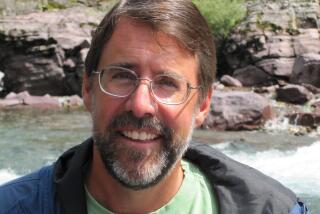Downriver: A YELLOWSTONE JOURNEY by Dean Krakel II (Sierra Club: $16.95; 272 pp.)
- Share via
The editors at the Sierra Club have stubbornly persisted in keeping the book-length essay alive. This endangered literary form is peculiarly suited to writing about nature and conservation: In its polemic, lyrical, or merely descriptive forms, it provides cerebral counterpoint to seductive picture books and crusading journalism. “Downriver: A Yellowstone Journey” is a classic contribution to the genre.
Dean Krakel’s book about his travels along the 700 miles of the Yellowstone River is like a dry Chardonnay. It’s approachable, yet circumspect, complex. It neither preaches nor makes pronouncements. Krakel traveled the upper reaches of the Yellowstone with his wife and child; another chunk with this companion or that. But the biggest reach, from the river’s departure from Yellowstone National Park to its confluence with Missouri, was traversed in an inflatable raft with only his dog, Stryder, for companion.
Beyond its significance as the greatest free-flowing river remaining in America, the Yellowstone is rich with classical Western history: The Crow, Sioux, and Cheyenne; Custer’s Last Stand; Lewis and Clark; Calamity Jane; Jim Bridger; the world’s first national park; riverboat men, buffalo hunters, cowboys. As Krakel travels, he switches easily from present to past, from his own voyage through wilderness to the first white people who saw that same country. The author has done his homework: Both his natural and social histories are literate and informed. Sadly, the present has added oil wells, strip mines, ditched cars, and ugly little Western towns; subtracted grizzlies, wolves, antelope, red men, and romance.
But Krakel is so damned understated that getting his points often is a process of extraction. Folks along the banks holler out greetings and questions to Krakel as he floats by. Their words and pastimes become part of his book, but often they get no word in reply. Although Krakel is a professional photographer, the only graphic in this book is a cramped, half-page pen-and-ink map of Yellowstone Country. Krakel touches upon the great issues of today--our insatiable need for ever more water, conflicts among wilderness, tourism, and resource extraction--but leaves us craving a fuller explication. Restraint, however, is what makes this book work, and work well indeed.
More to Read
Sign up for our Book Club newsletter
Get the latest news, events and more from the Los Angeles Times Book Club, and help us get L.A. reading and talking.
You may occasionally receive promotional content from the Los Angeles Times.







